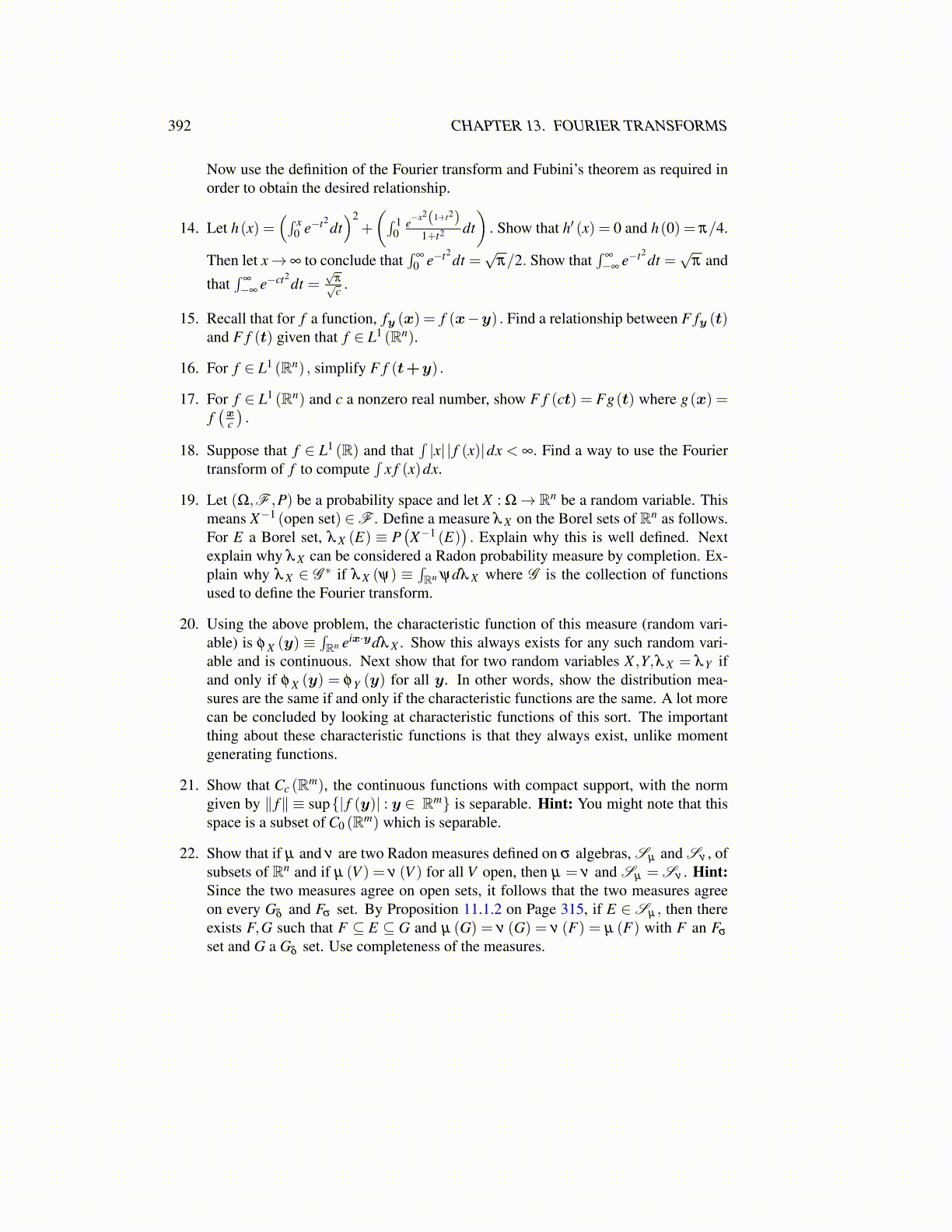
392 CHAPTER 13. FOURIER TRANSFORMS
Now use the definition of the Fourier transform and Fubini’s theorem as required inorder to obtain the desired relationship.
14. Let h(x) =(∫ x
0 e−t2dt)2
+
(∫ 10
e−x2(1+t2)1+t2 dt
). Show that h′ (x) = 0 and h(0) = π/4.
Then let x→∞ to conclude that∫
∞
0 e−t2dt =
√π/2. Show that
∫∞
−∞e−t2
dt =√
π and
that∫
∞
−∞e−ct2
dt =√
π√c .
15. Recall that for f a function, fy (x) = f (x−y) . Find a relationship between F fy (t)and F f (t) given that f ∈ L1 (Rn).
16. For f ∈ L1 (Rn) , simplify F f (t+y) .
17. For f ∈ L1 (Rn) and c a nonzero real number, show F f (ct) = Fg(t) where g(x) =f(xc
).
18. Suppose that f ∈ L1 (R) and that∫|x| | f (x)|dx < ∞. Find a way to use the Fourier
transform of f to compute∫
x f (x)dx.
19. Let (Ω,F ,P) be a probability space and let X : Ω→ Rn be a random variable. Thismeans X−1 (open set) ∈F . Define a measure λ X on the Borel sets of Rn as follows.For E a Borel set, λ X (E) ≡ P
(X−1 (E)
). Explain why this is well defined. Next
explain why λ X can be considered a Radon probability measure by completion. Ex-plain why λ X ∈ G ∗ if λ X (ψ) ≡
∫Rn ψdλ X where G is the collection of functions
used to define the Fourier transform.
20. Using the above problem, the characteristic function of this measure (random vari-able) is φ X (y) ≡
∫Rn eix·ydλ X . Show this always exists for any such random vari-
able and is continuous. Next show that for two random variables X ,Y,λ X = λY ifand only if φ X (y) = φY (y) for all y. In other words, show the distribution mea-sures are the same if and only if the characteristic functions are the same. A lot morecan be concluded by looking at characteristic functions of this sort. The importantthing about these characteristic functions is that they always exist, unlike momentgenerating functions.
21. Show that Cc (Rm), the continuous functions with compact support, with the normgiven by ∥ f∥ ≡ sup{| f (y)| : y ∈ Rm} is separable. Hint: You might note that thisspace is a subset of C0 (Rm) which is separable.
22. Show that if µ and ν are two Radon measures defined on σ algebras, Sµ and Sν , ofsubsets of Rn and if µ (V ) = ν (V ) for all V open, then µ = ν and Sµ = Sν . Hint:Since the two measures agree on open sets, it follows that the two measures agreeon every Gδ and Fσ set. By Proposition 11.1.2 on Page 315, if E ∈Sµ , then thereexists F,G such that F ⊆ E ⊆ G and µ (G) = ν (G) = ν (F) = µ (F) with F an Fσ
set and G a Gδ set. Use completeness of the measures.